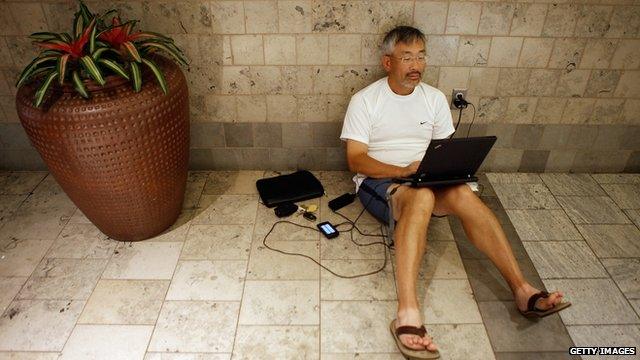How far will we go to charge our phones?
- Published
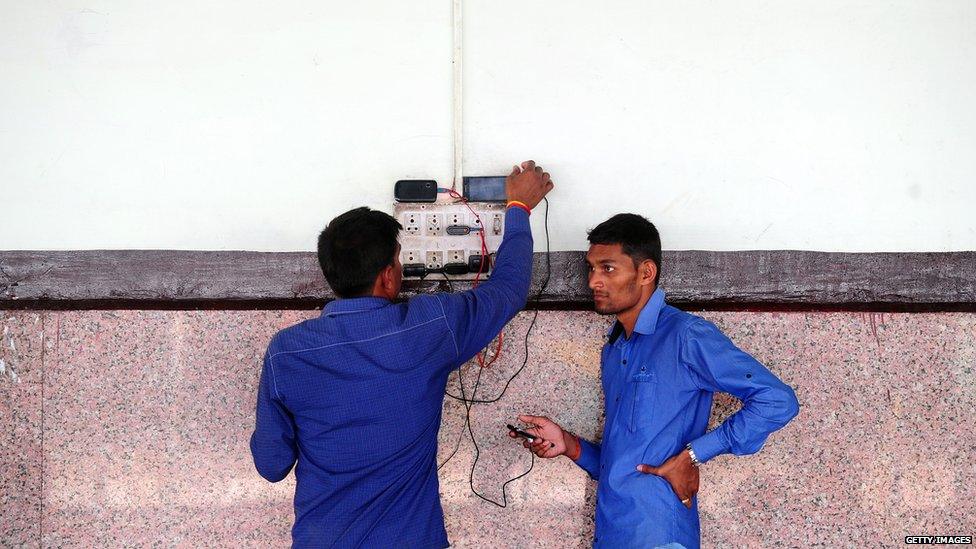
Charging is a waiting game and a balancing act for these men in India
An audience member at a Broadway show jumped on stage before the play began to plug his phone into what he thought was a power socket. But why are people driven to such lengths?
In the moments before a show or film starts it's customary to turn your phone off. But 10 minutes before a recent performance of Hand To God, on New York's Broadway, something strange happened.
"I witnessed something tonight that I never imagined I would see in a Broadway theatre," Chris York wrote on Facebook, external.
"I saw an audience member climb onto the stage right before the show and plug his cell phone into a (fake) electrical outlet on the set. ON. THE. SET. The crew had to stop the preshow music, remove the cell-phone, and make an announcement as to why you can't do that.

This stage photo from Hand to God shows the outlet which caused a scene, in the far corner of the stage
"Has theatre etiquette - heck, common sense - really fallen that far??"
It sounds like the worst example of a theatre faux pas, but most of us have also been in a similar dilemma. It's an almost daily power struggle as we glance at our phones, agonising over a red battery bar and its ever decreasing percentage levels.
It never used to be like this - in the old days, when mobiles just made calls, keeping charged was easy. Your handset might have looked and felt like a heavy brick, but it also had power for at least three days.
Now keeping your phone in the "green zone" can drive people to the most agile of feats - standing on tiptoes to reach an unusually high socket at an airport, squatting on the floor in a public toilet, or manoeuvring wires underneath a sea of tables in a coffee shop.

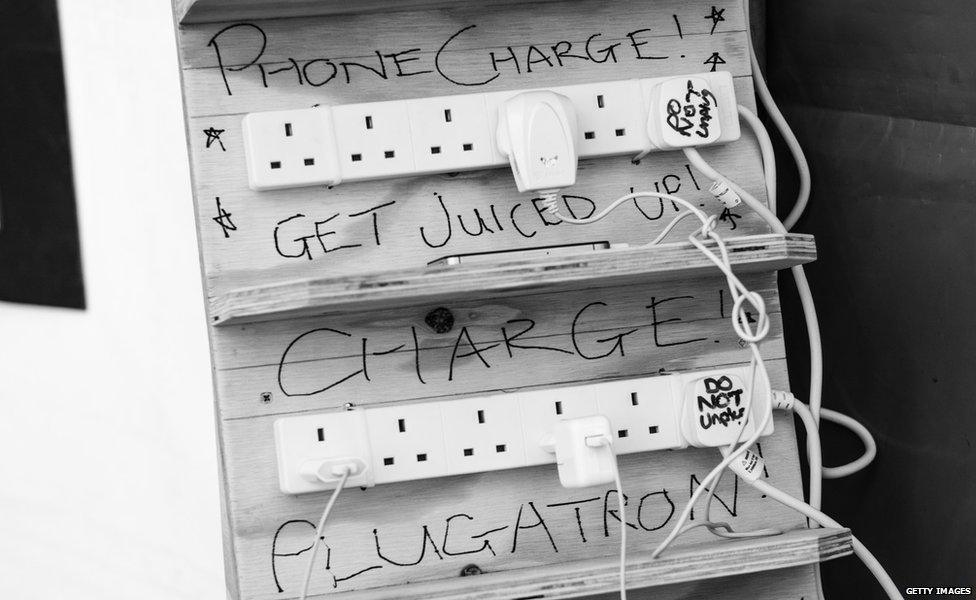
Music festivals, like Glastonbury, have charging stations for power hungry festivalgoers

Where's the power? Five novel charging ideas
converting telephone boxes
using lightning bolts
in some Indian villages, cook stoves charge phones
researchers are trying to charge by walking
sweat has been tested as a phone-charging method

This mark of desperation, is more common as more of us use smartphones loaded with apps, which devour battery power.
"Batteries are the overworked, underappreciated employees of the gadget world, as battery tech hasn't advanced at the same pace as the rest of the hardware in your phone," the BBC's Silicon Valley correspondent Dave Lee, external explains.
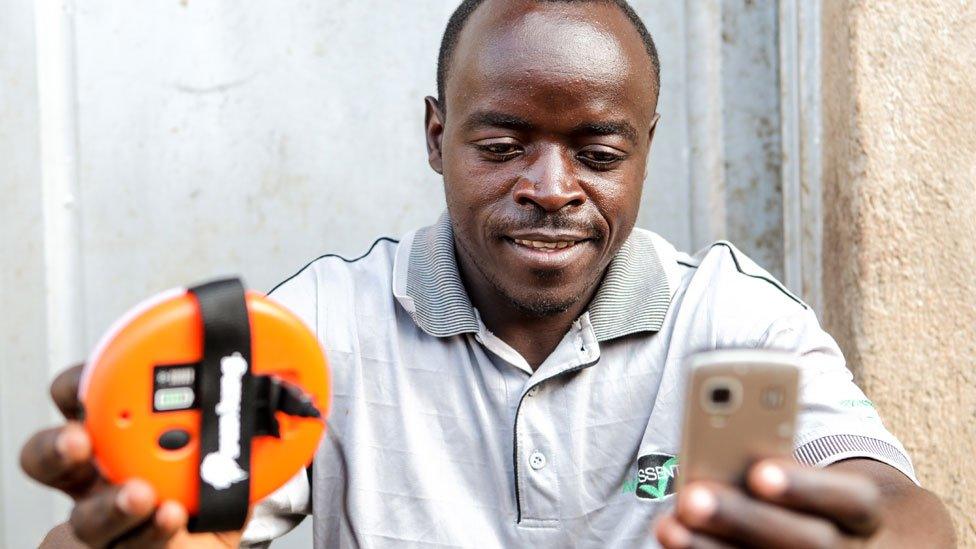
In countries like Rwanda, where mobile phone use is growing, charging is a necessity

Manufacturers are working to develop faster ways to charge. One of Samsung's latest models only takes 10 minutes to charge, Lee says.
But batteries are fighting a losing battle because many apps start draining battery life as soon as the phone is turned on.
"Device makers are also looking at how they can streamline their software to save power," Lee says. A low-power mode will be available in Apple's next update of iOS, extending the life by a few hours but greatly reducing the functionality.
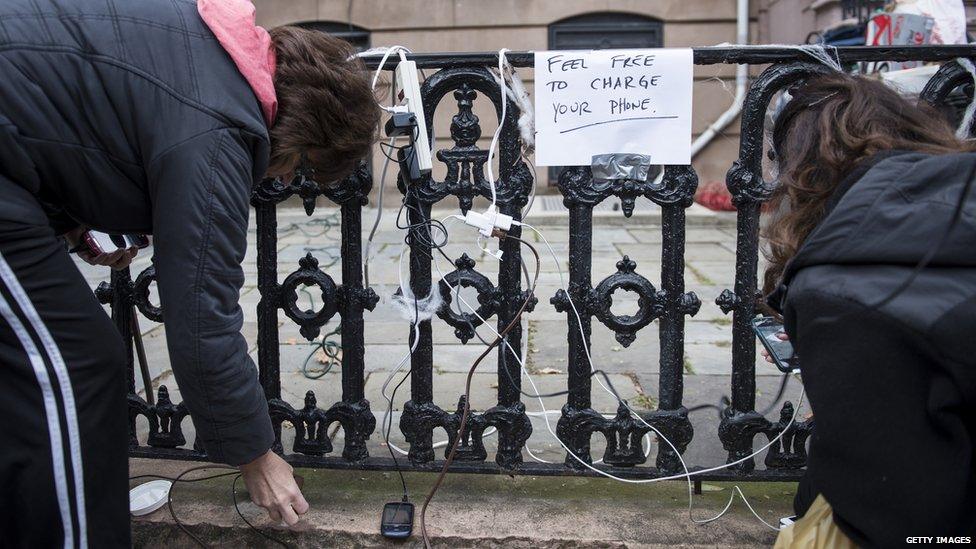
People charged their phones at makeshift charging stations after Hurricane Sandy in New York
As well as the phones themselves, there's now an entire economy built around portable charging devices, as long as you remember to charge those too.
Greenlight Planet, external, which manufactures and sells solar powered lamps, added a charging point to its product, the Sun King Pro, after repeated requests from customers.
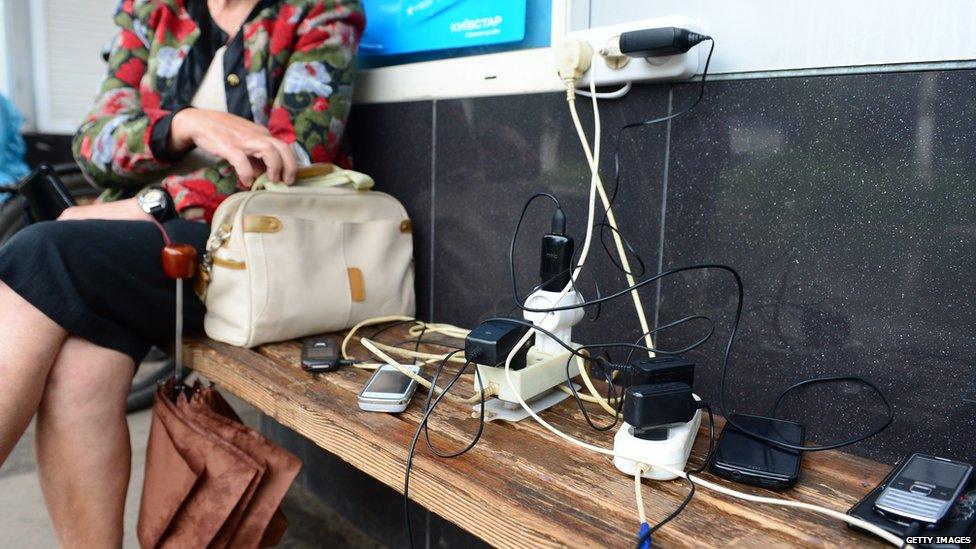
Residents charge their mobile phones at a kiosk with a rare working power outlet in the besieged city of Slavyansk on June 25, 2014
"So many off-grid households in East Africa told us light is nice to have, but mobile phones are now a necessity," says Radhika Thakkar, VP of global business development for the company.
Thakkar says as mobile phone use grows in these markets, people are using them for much more than just a phone call. They've become a primary tool for banking, accessing crop information as well as to get online.
Across the world, innovations are helping people keep their phones on for longer - a necessity in a world where more of us suffer from nomophobia, external, also known as "smartphone separation anxiety".
Research from the University of Missouri, external shows this affliction can increase our stress levels, and lead to serious psychological harm. Researchers say when separated "we experience a lessening of 'self' and a negative physiological state".
It might explain why some people are willing to go to any lengths, even jumping on stage at the theatre, to avoid the dreaded "battery low" message.
Follow Rajini Vaidyanathan on Twitter - @rajiniv, external
Subscribe to the BBC News Magazine's email newsletter to get articles sent to your inbox.
- Published15 March 2014
